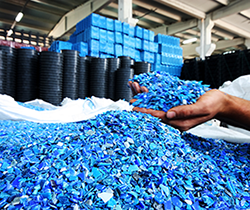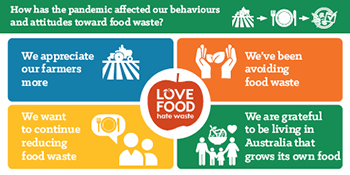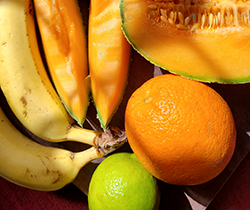Big changes afoot in the world of waste
NSW is transitioning to a circular economy over the next 20 years. This means we will minimise what we throw away and improve how we use and reuse our resources efficiently, making them as productive as possible.

Plastics ready for recycling to make other useful products
We will end up with less waste, less emissions, less harm to our environment and more jobs.
The NSW Government's new NSW Waste and Sustainable Materials Strategy 2041 and the NSW Plastics Action Plan outline many actions to tackle these issues.
Reducing the volume of food and garden waste going to landfill is a key focus of the Strategy. We have ambitious targets, including to reduce food waste from businesses that generate the highest volumes of food waste, such as large supermarkets and hospitality businesses, by 2025. Also, food and garden waste will be separately collected from all NSW households by 2030.
While plastic is a versatile and useful product, it’s also increasingly threatening our natural environment. Once in the environment, plastics take many years to degrade, often breaking into smaller parts which can kill our wildlife.
The NSW Government will phase out some of the most littered and unnecessary plastic items such as single-use plastic bags, within six months, and plastic straws, within the next year. This will stop almost 2.7 billion pieces of plastic litter from entering the environment over the next 20 years.
The EPA was on board for Plastic-Free July last month – head to NewsRound for some great tips to avoid single-use plastics.
Bold new litter reduction target for 2030
With the previous state target to reduce litter by 40% by 2020 exceeded (we achieved 43%), planning is now underway to deliver against a 2030 target to reduce litter items by 60% as set out in the Waste and Sustainable Materials Strategy 2041.
We will be tracking our progress against our new target through the Key Littered Item Study – which has been established to assess marine debris.
Plus new programs are being developed including additional grants scheduled to open later this year. This will provide funding for councils and communities to develop strategies and projects to reduce litter in their local areas and support the new state litter target.
The Report a Tosser campaign continues to evolve with a marine litter campaign featuring a song by Rocky the Lobster.

Lockdowns have given people a new appreciation for food preparation and avoiding waste
COVID impact on saving food waste
The COVID lockdowns have meant that people are staying at home. One positive outcome is that people are thinking more about the value of food and the food supply chain.
An EPA study in 2020 found that half of us enjoy cooking and preparing food, with 37% valuing food more since Covid-19 hit. Plus, the pandemic has made 44% of us more interested in where our food comes from.
The study also found that people are picking up positive behaviours that help reduce food waste:

Storing fresh food, particularly locally grown, has become important during the pandemic
- 30% are more often checking the food they already have at home before leaving the house to shop.
- 24% have been freezing food more often to extend its shelf life.
- 20% are thinking more about the best way to store food to keep it as fresh as possible.
The pandemic experience has made 86% of us glad to live in a country like Australia that grows enough of its own food. 70% say they appreciate farmers more and 59% say they are determined to waste less food due to the lockdown experience.
To find out more about how you can reduce food waste visit the NSW EPA’s Love Food Hate Waste website..

